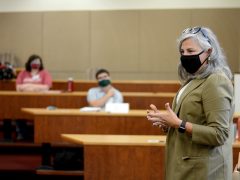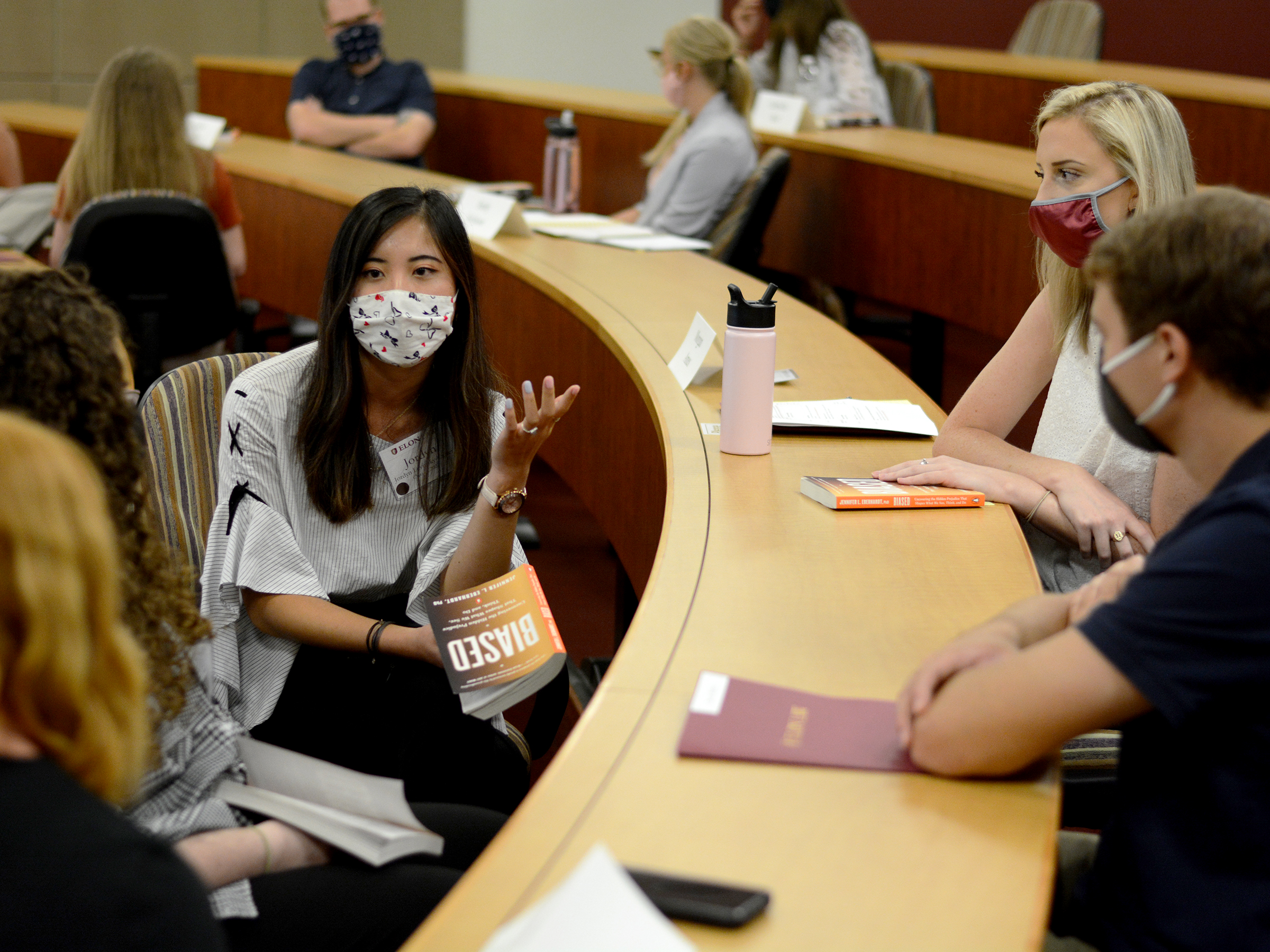A recent book discussion about the way history, culture, and psychology can shape stereotypes offered Elon Law’s newest students an opportunity to learn about each other during Orientation for the Class of 2022.
Policing. Housing. Education. In nearly every aspect of contemporary life, long-held stereotypes ingrained in American psyches have led to public policies that often foment racial disparities and inequities.

Now, a Stanford University professor and the author of Elon University’s 2020-2021 Common Reading selection, “Biased: Uncovering The Hidden Prejudice That Shapes What We See, Think, And Do,” is using extensive research to offer her readers valuable tools to acknowledge and overcome such stereotypes in pursuit of a more just world.
Elon Law’s newest students are already taking note.
Conversations about race, bias, prejudice – all framed in the context of Stanford scholar Jennifer Eberhardt’s book – were part of Orientation activities for members of the Class of 2022 who arrived last week in Greensboro for the start of their legal education.

Several Elon Law professors and staff led the Aug. 5 discussions as students were prompted to reflect on their own experiences and to share with their classmates how Eberhardt, a MacArthur ‘Genius’ Grant recipient, spurred an examination of their future roles as lawyers.
In the words of one new Elon Law student: “We’re a diverse group and I’m sure there are different schools of thought, but our world is moving to a point where the debate isn’t about whether these issues exist – instead, it’s how to fix them.”

Student Reflections on “Biased” and Elon Law’s Common Reading Conversations
- “It is a necessary piece of literature, especially in these times, and it is germane to conversations being held nationally about race, bias and policing. The book hit pretty close to home … and it helps put things in perspective, but it also makes me hopeful that an institution like Elon is recognizing how students are affected. When I listened and interacted with others, I saw a new generation of leaders ready to pivot from the status quo and address these issues.” – Emmanuel Agyemang-Dua L’22
- “What struck me the most was Dr. Eberhardt’s observation regarding how some teachers promote the ‘color blindness’ approach to racial diversity. As a non-traditional 1L – I’m 52 – I relate to this teaching approach. Basically, we were told in the 80s that to be ‘non-racist’ we should look past color altogether. However, as Dr. Eberhardt points out, ‘when people focus on not seeing color, they may also fail to see discrimination.’ Not focusing on racial diversity fails to acknowledge racial biases that continue to plague our country. Rectifying this perpetuation of racial inequality is the long overdue challenge and heavy burden today’s generation is tasked with.” – Tom Harvey L’22
- “The book was really insightful and a helpful way to start the year at Elon Law. It put us all on the same page, and helped us understand that we all have biases that we need to recognize and work toward dismantling. … It’s made me look forward to what the next two and a half years will bring, knowing that we’re all starting off on the same foot.” – Brittany Graybeal L’22
- “I loved the book. It reminded me of ‘Just Mercy.’ I was able to relate because, as an African-American male, when she shared her personal stories I went, ‘Oh, I’ve had these same experiences.’ And I wasn’t expecting to have this kind of talk. I thought, ‘We’re going to have a discussion on this? These are things we don’t usually talk about. We keep this to ourselves!’ This book brought us all closer. Others were able to understand and be more educated on what goes on.” – Gary Hooker Jr. L’22
- “It was a difficult read for me. It was well written and informative, but it did reinforce things I know to be true. It made me reflect on experiences I’ve had and the experiences of black people as a whole. … But the discussion themes were helpful because many people really do have good intentions. They’re all committed to finding a way to plot a path to get us beyond the stereotypical views we have of each other.” – Brittany Willis L’22
- “Reading this book, and having this discussion right out of the gate with everything going on in the world, and especially in the United States right now with race, I do think there were themes important to address. Not that racism and these issues have not existed before – of course they have! They’ve existed for hundreds of years! But the media is now reporting on it and I’m hopeful that the needle is moving in a positive direction. As attorneys and future attorneys, we have a responsibility to educate ourselves on these topics.” – Alex Swanson L’22



